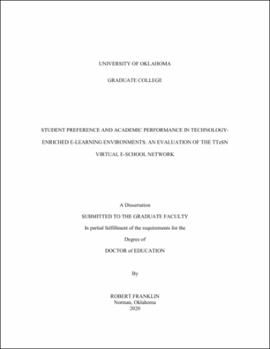| dc.contributor.advisor | Ford, Timothy | |
| dc.contributor.author | Franklin, Robert | |
| dc.date.accessioned | 2020-08-21T15:31:46Z | |
| dc.date.available | 2020-08-21T15:31:46Z | |
| dc.date.issued | 2020-08 | |
| dc.identifier.uri | https://hdl.handle.net/11244/325393 | |
| dc.description.abstract | This evaluation of the Tulsa Technology Center eSchool Network explored two years of empirical evidence where secondary students (N=382) took over 500 online virtual e-learning core academic courses in English II and III as well as Geometry and Algebra II. The study examined students’ performance in these e-learning platforms by reviewing course completion grades, and the study compared the association of days to complete online virtual courses on earned course grades. The study revealed that there was high variation in the time to completion of virtual e-learning platform courses in comparison to a fixed school calendar. The study further indicated there was no association influence of time spent on a virtual e-learning course and grades earned for the course.
The study also compared performance levels on state mandated end of course exams for students that completed a virtual e-learning course to those that took the same course in a traditional face-to-face format. The findings of the study indicated that students who completed a virtual e-learning course scored at significantly lower proficiency rates on Oklahoma’s English II and Algebra II exams when compared to end of course scores of traditionally trained students. Conversely, there was no statistically significant difference noted when conducting the same comparison for English III and Geometry end of course exams.
Lastly, the case study conducted a survey seeking Tulsa area students’ feedback about learning platform preferences, and it was found that a larger portion of students indicated a preference for virtual e-learning platforms over the traditional face-to-face school design. The survey responses regarding preference for a customized e-learning platform aligns with the data trends that have emerged throughout the past decade in Oklahoma.
The findings of this evaluation study provide some support for the assertion that virtual and blended e-learning platforms can provide Oklahoma’s secondary students with viable and relevant learning options which support expectations for high school graduation as well as support efforts to score proficiently on state mandated tests. Yet, the study demonstrates that for Oklahoma e-platforms to meet their promise and potential, greater attention needs to be paid to how stakeholders ensure that participating students perform on-par academically with their traditional course taking peers.
Key words: Technology enhanced, technology enriched, virtual e-learning, techno-centric, distance education, blended and online learning. | en_US |
| dc.language | en_US | en_US |
| dc.subject | Virtual School Performance | en_US |
| dc.title | STUDENT PREFERENCE AND ACADEMIC PERFORMANCE IN TECHNOLOGY-ENRICHED E-LEARNING ENVIRONMENTS: AN EVALUATION OF THE TTeSN VIRTUAL E-SCHOOL NETWORK | en_US |
| dc.contributor.committeeMember | Adams, Curt | |
| dc.contributor.committeeMember | Edwards, Beverly | |
| dc.contributor.committeeMember | Horm, Diane | |
| dc.date.manuscript | 2020-08-03 | |
| dc.thesis.degree | Ed.D. | en_US |
| ou.group | Jeannine Rainbolt College of Education::Department of Educational Leadership and Policy Studies | en_US |
| shareok.nativefileaccess | restricted | en_US |
